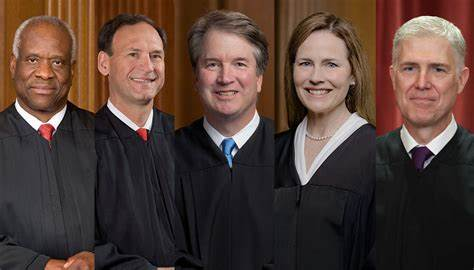No candidate in recent American history has run such a presumptuous, flatulent campaign for President. Kamala Harris had nothing to speak of, nothing of note or political worth; just a racial and sexual identity which she assumed would be all she needed to get to the White House.
'It is time', she said, addressing a crowd, 'for a proud black woman to achieve the highest office in the land. It is our time', she went on, 'our time and your time, the time of a lifetime, the moment of history we have all been waiting for, an anointed time, a blessed time a....'
Here her chief campaign advisor gave her the 'cut' sign, doing a pre-arranged finger ballet that silently called for another play, but the Vice President was on a roll. 'When I was growing up in the inner city... (here the aide winced)...a child of misfortune and oppression, I never imagined this moment of destiny, but here I stand before you....'
The loudspeakers squawked and screeched, the aide's last resort to cut the woman short. Once she got her engine stoked, there was no stopping her. 'Ladies and gentlemen', the aide shouted to the crowed as he escorted Kamala off stage, 'the next President of the United States'.
And so this vaporous, airy, insubstantial woman went banging on from stop to stop making no sense, trotting out old chestnuts, Trotskyite non sequiturs, and just about every other thought that came into her porous, well-ventilated brain.
At a meeting of her inner circle well into the campaign, a number of aides voiced their concern. Donald Trump, despite every possible booby trap they had set, every conceivable lawsuit, every possible hateful screed and invocation of evil, was still a comer, rising in the polls, defying every assumption of miserable defeat touted by the Left.
While Trump was laying out his platform - strong, defiant statements about immigration control, energy exploration, free markets, confrontational geopolitics, and a rollback of woke genderism - their candidate was still howling at the moon.
The black thing, the woman thing whacked and thumped, touted, hammered until it was just a dented lump of no luster, brightness, or meaning was all she seemed to be able to muster. Cackling and crowing, she went down to defeat.
'How could this be?', she asked herself, a woman marked for greatness; and yet there it was, plain as day, irrevocable and done. 'But there is a next time', she consoled herself, a time when the demon is off the political stage, and the decks are clear for running. 'Right on!' her aides shouted in unison; but few stayed on for the lady's second act. They had seen enough.
President Biden was on his own crazed journey to a post-electoral world, and as a final act of bitter vengeful spite against the man who would replace him, he opened the doors to death row and let out a spate of convicted murderers. 'There! That'll show him', Biden was heard to have said as he signed the pardon papers in front of him.
Show whom? his aides wondered, for it was Kamala who had thrown him under the bus. Joe had no gripe with Trump, a politician doing his thing, nothing more. It was the Kamala Cabal that fired up the boiler and her troop of lackeys and wannabes who set the progressive course. As a parting shot, he should take aim at that bitch, that calculating airhead.
So with Biden's St. Vitus' dance of political hysteria - open the floodgates of the Treasury and watch billions pour out willy-nilly, unaccounted for, and impossible to stop; and open the doors to death row to let out the most scroungy and disreputable killers ever locked up; and open the Southern border to all comers, and let them join in the fun - Kamala's decision to take leadership of the Democratic Party and run again in 2028 was overlooked.
'Bad timing, Madam Vice President', her chief aide commented, 'but you will have your day'. This said as he was out the door, back to his law practice or lumber mill, never again to show up in Washington.
'Gotta give it to the lady', said a Trump operative. 'She comes from a line of ditzes - Hillary and that Alaska clown who ran with McCain - yet she still thinks she matters'. At least Sarah Palin ran on a platform, although she never recovered from her 'I can see Russia from here' dopey comment about dealing with Putin.
Hillary was the back channel of Kamala's woman thing. She insisted that it was time for American to elect a woman, and so sure was she that she would be elected, she chose to keep her mouth shut, avoid controversy, and let the electorate do the right thing.
She was even more nonplussed and gobsmacked than Kamala when beaten by Donald Trump. Hillary actually believed that she had been touched on the shoulder by God himself, while Kamala settled for secular justice. Both women learned the hard way that good intentions and an empty head will get you nowhere.
'Dummies rule!' chirped a member of the incoming Trump Administration, laughing about the fumbled and botched White House coup, the cackling harpy down the hall, and the bitchy little ankle-biters in Congress who thought they knew a thing or two, but who got laughed out of town. 'By the way, where is that bad joke?'
She was nowhere to be seen, not because she was ashamed to show her face but because she was already jockeying for position. Usually the candidate for president is considered the leader of the party, but in this case, given her humiliating defeat against all odds, and the conservative juggernaut gathering steam in all quarters, Democrats were wondering whether it was time to ditch the woman for good.
'It's never too early for the good fight', she said to her tightening circle of supporters, 'so let's get to it'; but there was only desultory interest in that idea, and most of those gathered in the war room of the Vice President had already secured positions elsewhere. Kamala was too dense to take the temperature of the room, sense its indifference, and see how to most she was just whistlin' Dixie; so she shuffled her papers and started to talk about Nebraska and Bernie Madoff, non sequitur, random bits of supposed relevance left over from the campaign.
'Well, thank God, she's gone', said an Iowa delegate who had pledged her support for Harris, but then, after a whistle-stop tour of the state where the Lady talked gobbledygook, turned in her pass. Legions of supporters did the same thing leaving only a small gaggle of weird progressive shills behind.






































